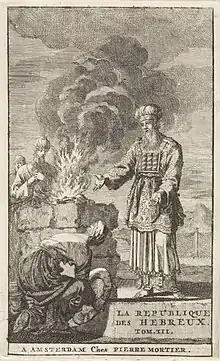Hebrew republic
The Hebrew Republic, also “De Republica Hebraeorum”, and also “Respublica Hebraeorum”, is an early modern concept in political theory in which Christian scholars regarded the Hebrew Bible as a political constitution framing a perfect and republican government designed by God for the children of Israel.[1][2][3]

In 1582, Carlo Sigonio published a text entitled De Republica Hebraeorum. It used the format of the De repubblica Athenensium manual. The question of the political structure in ancient Israel had already been addressed before, but Sigonio was the first to adopt a systematic approach. However, he did not know Hebrew and so used the translation of the Septuagint, giving rise to not a few problems.[4]
Among the most notable works in the genre are “De Republica Hebraeorum” by Petrus Cunaeus [5][6] and Eric Nelson's "The Hebrew Republic".[7] A Catholic contributor to the respublica Hebraeorum genre was the Jesuit Giovanni Stefano Menochio, who published his own De republica Hebraeorum in 1648.[8]
References
- "Subjects and Series | Harvard University Press".
- Tuck, Richard, Philosophy and government, 1572-1651, Cambridge, 1993, p. 167
- Lea Campos Boralevi, Classical Foundational Myths of European Republicanism: The Jewish Commonwealth, in Martin van Gelderen and Quentin Skinner, Republicanism: A Shared European Heritage, Cambridge University Press, 2002, p. 258
- Fausto Parente (2010). "Il "De Republica Hebraeorum" di Carlo Sigonio". Rivista di Storia della Filosofia. 65 (3): 423–459. JSTOR 44025857.
- Tuck, Richard, Philosophy and government, 1572-1651, Cambridge, 1993, p. 167
- Lea Campos Boralevi, Classical Foundational Myths of European Republicanism: The Jewish Commonwealth, in Martin van Gelderen and Quentin Skinner, Republicanism: A Shared European Heritage, Cambridge University Press, 2002 , p. 258
- Eric Nelson, “The Hebrew Republic: Jewish Sources and the Transformation of European Political Thought” (Harvard University Press, 2010)
- Eric Nelson (2010). The Hebrew Republic. Harvard University Press. p. 150. ISBN 9780674050587.
Further reading
- Fania Oz-Salzberger (2002). "The Jewish Roots of Western Freedom". Azure. 13: 88–132. Archived from the original on 2004-09-10.
- Lea Campos Boralevi, Classical Foundational Myths of European Republicanism: The Jewish Commonwealth, in Martin van Gelderen and Quentin Skinner, Republicanism: A Shared European Heritage, Cambridge University Press, 2002, p. 258.
- François Laplanche (2008). "Christian Erudition in the Sixteenth and Seventeenth Centuries and the Hebrew State" (PDF). Hebraic Political Studies. 3 (1): 6–7, 10, 12, 16–18. S2CID 26623650. Archived from the original (PDF) on 2019-02-26.